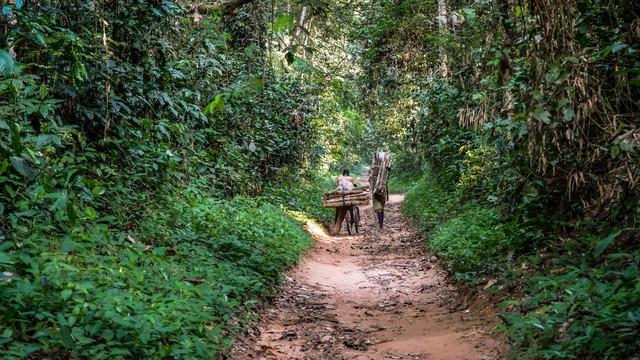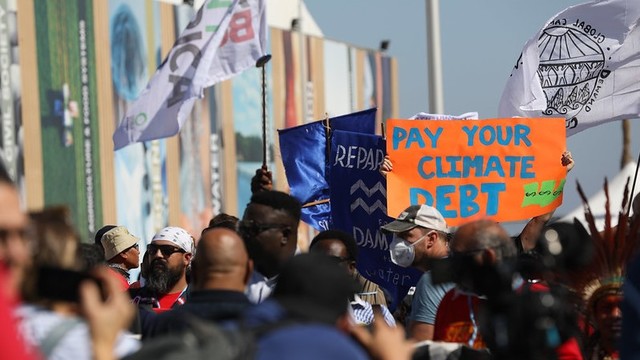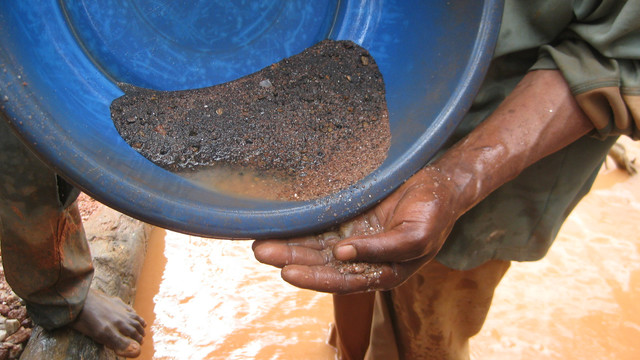
A municipal market in Tucuru, Guatemala. The COVID-19 pandemic has widespread consequences and IIED will have to adapt its work (Photo: UN Women/Ryan Brown, via Flickr, CC BY-NC-ND 2.0)
Despite the tough operating environment, IIED improved its financial resilience in 2019/20, with expenditure reduced from GBP£4.0 million to £3.9 million.
Income was lower than the previous year, £18.4 million against £20.8 million recorded in 2018/19, while the average number of employees increased to 133 (2019:130), with further expansion in the institute's research activity.
As the mix of programmes changed, payments to collaborating entities reduced from £5.1 million in 2018/19 to £3.6 million in 2019/20.
A programme of operational strategies, to support the implementation of IIED’s new institutional strategies, was launched across five areas: people, business development, finance, international operations (including working with partners) and environmental stewardship.
IIED signed a 10-year lease on a new, larger office in Edinburgh to support continued careful expansion of its research programmes, and moved to the new building in August 2019. IIED’s 10-year lease on its London office was due to end on 16 December 2020. This provided a very timely opportunity, as IIED adapted rapidly to remote working due to COVID-19 to rent an interim office giving greater flexibility while IIED makes longer-term decisions about our future needs.
IIED has no fundraising activity and is not a grant making organisation; instead it works in collaboration with its partners, resulting in no fundraising activity and grant making disclosures being given.
Reserves policy
During 2019/20, IIED trustees reviewed the reserves policy to ensure it is aligned with the new five-year strategy launched in April 2019.
To protect the organisation and its charitable programme against the risks of funding loss through income shortfalls and other unexpected financial losses, IIED’s reserves policy sets a target for total unrestricted reserves of approximately four months of operating costs and staff salaries less liabilities from employee benefits (around £2.2 million). Trustees have therefore set the target range of free reserves (being total unrestricted funds less designated funds and fixed assets) at between £1.9 million and £2.5 million.
Total funds at year end are £2.6m, entirely comprising unrestricted funds (2019: £2.77m). The decrease in reserves in 2019/20 follows an increase in the dilapidations provision that is payable on the termination of the lease on the London site. The total free reserves have decreased to £2.01 million (2019: £2.13m), comfortably within the target range endorsed by the board.
Investment policy
IIED invested its cash in fixed-term treasury deposits during 2019/20. This policy produces an acceptable rate of return while giving us flexibility to access funds.
Related parties
Some IIED trustees are also trustees of other charities or directors or senior officers in other organisations IIED works with as a normal part of its research activities. Where such work involves payment, they enter into arm’s length contracts and any payments related to these contracts are detailed in the notes to these accounts. The board operates a conflicts of interest policy.
Looking ahead
The COVID-19 pandemic is a world-changing event that will cause radical disruption of social and economic life on a global scale, and we need to come to grips with these changes across the full range of our work.
On a practical level, we must adapt to an online working environment and re-programme our activities to enable delivery in the face of severe international and local travel restrictions. We are well equipped to deal with the move to online working, thanks in part to the significant investments we have made in our IT infrastructure and finance, project and HR systems over the past three years. And we have launched a project to identify strategies and actions that could go beyond ‘making do’ to put us at the forefront of digital working.
Beyond the practicalities of coping with the pandemic, we will also have to reframe and rethink our substantive agendas in the COVID-19 world. This does not necessarily mean that we focus directly on COVID-19. But it does mean that we recognise the significance of the changes in motion from the crisis and adapt our work accordingly. We must also consider whether the consequences of the pandemic warrant a mid-term update to our strategy in 2022.
One of the areas where the pandemic has set in motion deep changes is in societal attitudes to race and racism. The heightened emphasis on inequality, and the global movement to combat racism in the wake of the killing of George Floyd, have led us to start a process to see how we can strengthen our diversity and inclusion policies and the contribution we make to anti-racism in the environment and development community. We have formed a race and racism working group to drive forward our work in this area. We will build on our successful efforts to mainstream gender equality throughout our work and practices in taking this forward.
- The trustees' report and accounts for the year ended 31 March 2020 contains detailed financial information, including a breakdown of all income received by IIED above £10,000.
Value for money statement
Demonstrating value for money is ever more important for organisations using public funds. With aid budgets under pressure, development organisations need to show that they are efficient, that poor people's lives are actually improving, and that the environment is protected. Read our value for money statement on our Publications Library.
Previous reports
See the financial summaries from previous years: 2019; 2018; 2017; 2016; 2015; 2014; 2013
2019/20 financial summary
Donors
Government and government agencies
Swedish International Development Cooperation Agency (SIDA)
Irish Aid, Department of Foreign Affairs
Department for International Development (DFID)
Federal Ministry for The Environment
Embassy of Sweden, Kenya
Department for Environment, Food and Rural Affairs (DEFRA)
The Secretary of State for Health
Minister for Foreign Affairs and Trade of Ireland
Ministry of Environment, Sweden
Deutsche Gesellschaft Fur International Zusammenarbeit (GIZ) Gmbh
German Institute for Development (DIE)
Niger Basin Authority
Royal Danish Ministry of Foreign Affairs
Royal Government of Bhutan
Agence Francaise De Developpement
Swissaid
Embassy of Ireland In Tanzania
Finnish Ministry for Foreign Affairs
International and multilateral agencies
Economic and Social Research Council (ESRC)
Mava Foundation
Hivos
Wellspring Philanthropic Fund
World Resources Institute (WRI)
Wyg International Ltd
Stockholm Resilience Centre
Near East Foundation
The British Academy
New Venture Fund
LTS International Ltd
Overseas Development Institute
International Livestock Research Institute
European Climate Foundation
Mercy Corps USA
University of Manchester
WWF Netherlands
Arts & Humanities Research Council
Schmidt Family Foundation
Charles Stewart Mott Foundation
Global Center on Adaptation
Arcus Foundation
WWF Sweden
University of Evora
University of Southampton
International Union for Conservation of Nature
Christian Aid
International Land Coalition
Tufts University
Royal Society for the Protection of Birds
Global Wildlife Conservation
Wellcome Trust
Eventbrite
International Institute for Sustainable Development
Institute of International Education
United Cities and Local Governments
Enda Pronat
Strathclyde University
University of Oxford
Oxford Policy Management
Institute of Development Studies (IDS)
Traffic International
Wellbeing Economy Alliance
WWF International
British Council
World Conservation Monitoring Centre
International Union for Conservation of Nature
Conservation Through Public Health
Climate-KIC Holding B.V. Netherlands
University of Edinburgh
Sustainable Use and Livelihoods Specialist Group
Global Resilience Partnership
Ford Foundation
Ag Innovations Network (Sustainable Food Lab)
Annenberg Foundation
RSF Social Finance
Shack Dwellers International
Wallace Global Fund
Binks Trust
UNICEF
Kings College London
Bangladesh Rural Advancement Committee
The Spindrift Foundation
Climate Focus
David & Lucile Packard Foundation
Red Cross Red Crescent Climate Centre
Institute of Geographical Sciences
Conservation International
Institute for Essential Services Reform
International Development Research Centre (IDRC)
IED Afrique
University of York
Natural Environment Research Council
Luc Hoffman Institute
Corporate
KPMG International (UK)
PricewaterhouseCoopers London
PricewaterhouseCoopers Limited, Kenya
KPMG East Africa
DAI
Altair Asesores S.L.
SAGE Publications Ltd
DAI Europe LTD
IPE Global Limited
Le Groupe-conseil Baastel ltée
Adam Smith International



